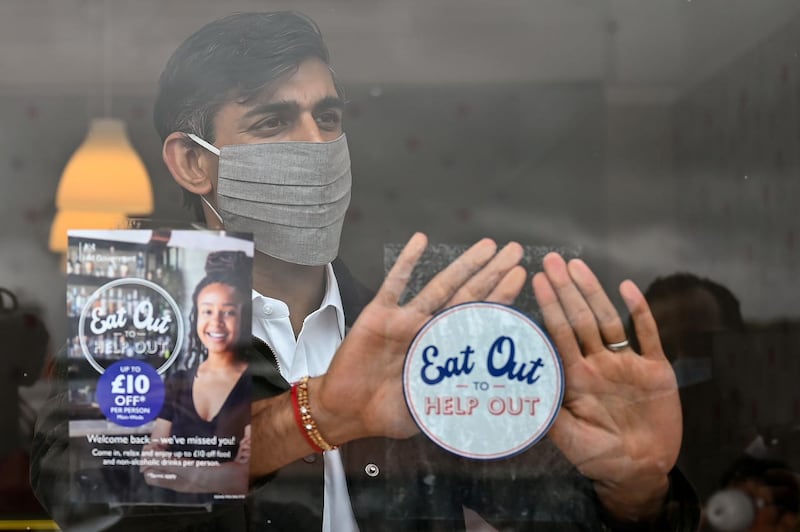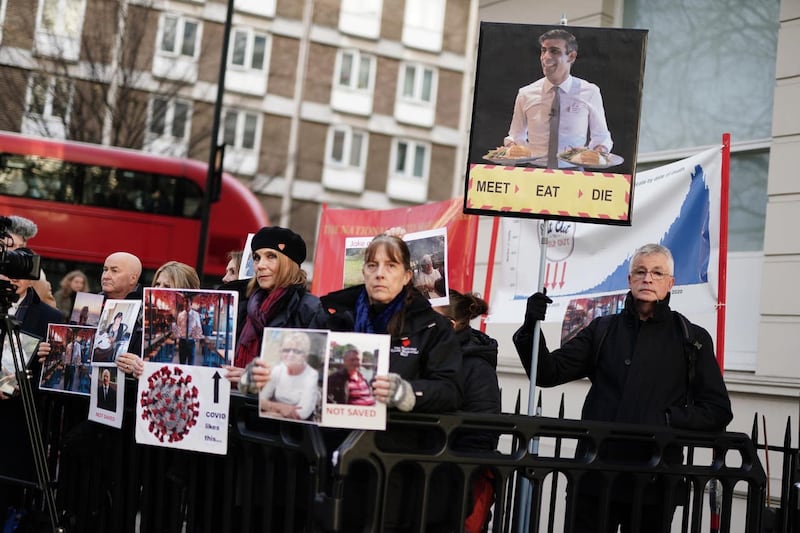Rishi Sunak made an impassioned defence of his Eat Out To Help Out scheme during a six-hour evidence session in front of the Covid inquiry.
The Prime Minister, who served as chancellor during the coronavirus pandemic, introduced the hospitality discount scheme in 2020 to support the hard-hit sector as the UK emerged from coronavirus restrictions imposed during the first lockdown.
Critics have claimed the policy – announced as part of Mr Sunak’s summer economic update on July 8 2020, and providing 50% off the cost of food and/or non-alcoholic drinks – helped the virus to spread.
But Mr Sunak said hospitality settings were “safe” places as he told the inquiry his intervention was the “right thing to do” and had protected millions of jobs.
Asked by Leslie Thomas KC, representing the Federation of Ethnic Minority Healthcare Organisations, if the scheme put low-paid workers into a setting where there was an increased risk of infection, Mr Sunak replied: “No, I don’t agree with that.
“These workplaces were safe and deemed to be safe for everybody as a result of the Covid secure guidance that they had to comply with as a matter of reopening – and that was determined by the overall reopening plan.
“And actually what it did was protect those people’s livelihoods. The risk was those people wouldn’t have a job to go to if we hadn’t done something to help make sure their businesses were operating.
“And I think that would have had devastating socio-economic and health consequences for those low-paid people if the job they depended on disappeared.
“The consequences for them and their family of not having a job would have been incredibly significant. I wanted to do everything I could to prevent that from happening and to save their jobs.”

The announcement of Eat Out To Help Out blindsided both key scientific advisers and Mr Sunak’s then Cabinet colleagues, including former health secretary Matt Hancock, who have told the public inquiry that the first they knew of it was when it was made public.
Professor Sir Chris Whitty, England’s chief medical officer, is said to have privately referred to the scheme to boost the restaurant industry as “eat out to help out the virus”.
Sir Patrick Vallance, who was chief scientific adviser, previously told the inquiry the scheme was “highly likely” to have fuelled deaths.
Questioned by lead counsel for the inquiry Hugo Keith KC about the scheme, Mr Sunak said such concerns were not raised with him despite there being a one-month gap between it being announced and the discount coming into effect.
He said there had been “ample opportunity” for people to raise concerns with him or then-prime minister Boris Johnson during that period.
The evidence session on Monday kicked off a crucial week for Mr Sunak as he faces a crunch vote on his Rwanda legislation on Tuesday as he looks to fulfil his “stop the boats” pledge.
Chairwoman Baroness Hallett, when thanking the Prime Minister for his time in front of the inquiry, said she recognised his attendance had been “difficult (during) this particular week”.
Mr Sunak’s all-day appearance marked the end of the oral evidence for Module 2 of the inquiry, which is looking into decision-making during the pandemic.
The module has also seen contributions from Mr Johnson, Mr Hancock and Mr Johnson’s former chief adviser Dominic Cummings, among others.
Mr Johnson and the way he ran his Downing Street administration has come in for criticism in evidence heard by the inquiry, but Mr Sunak appeared reluctant to echo those remarks.
At the hearing in west London, Mr Sunak defended Government decision-making during the Covid crisis, saying ministers were “following advice from the scientists”.
The Prime Minister said Mr Johnson’s administration acted “almost immediately” on the recommendations from scientific experts when it came to imposing restrictions.
He said that as the advice changed during March 2020 in the lead-up to the first lockdown, ministers responded with fresh announcements.
“My strong recollection from this period is that the Government acted, I think almost immediately, on the recommendations from Sage (Scientific Advisory Group for Emergencies),” he told the inquiry.

In his opening remarks, the Prime Minister told bereaved families that he was “deeply sorry” for the losses they experienced during the pandemic.
He said it was “important that we learn the lessons so that we can be better prepared in the future”.
The inquiry has not been given sight of Mr Sunak’s WhatsApp communications, something the Prime Minister blamed on switching his mobile phone “multiple times” in recent years and not backing up his messages.
He said he was never advised to save the exchanges, even after Mr Johnson announced he was establishing an inquiry in May 2021, despite key conversations about the Government’s response taking place via the messaging app.
Jean Adamson, part of Covid Bereaved Families for Justice UK, told reporters: “The fact that he has refused to hand over his WhatsApp messages shows that he is not interested to learn lessons and save lives, and that he takes us for idiots.”
During the course of Monday’s evidence, Mr Sunak touched on the different types of financial support given to people during the pandemic, including the furlough scheme and payments provided to people when self-isolating with Covid.
He told the inquiry that the record-high tax burden “which we’re grappling with today” is a consequence of lockdown borrowing.
Mr Sunak said: “We were able to borrow what we needed to fund the pandemic response.
“The impact of having to pay it back only comes well after the fact when everyone forgets why it was necessary and now everyone is grappling with the consequences.
“I am grappling with the consequences of that as we have a tax burden that is higher than I would like.”








